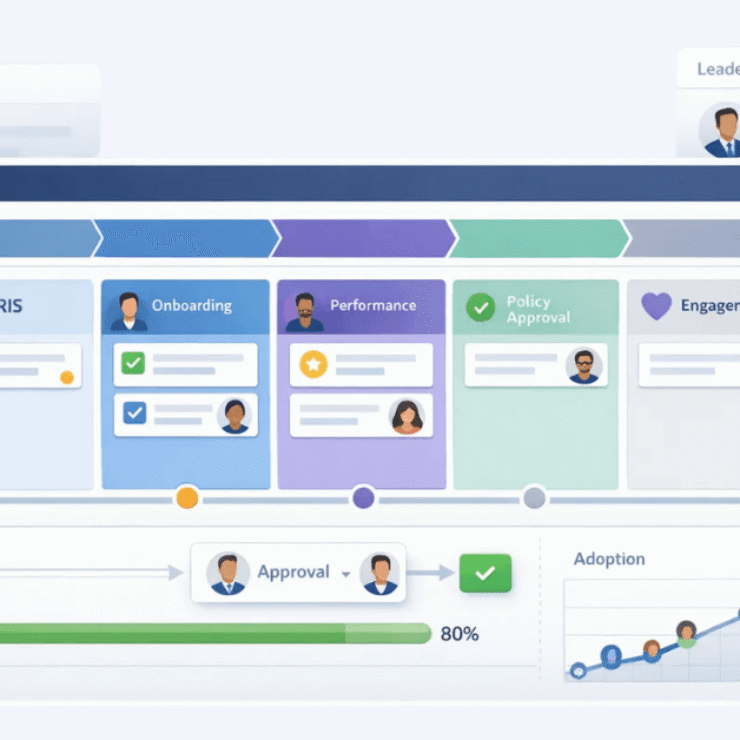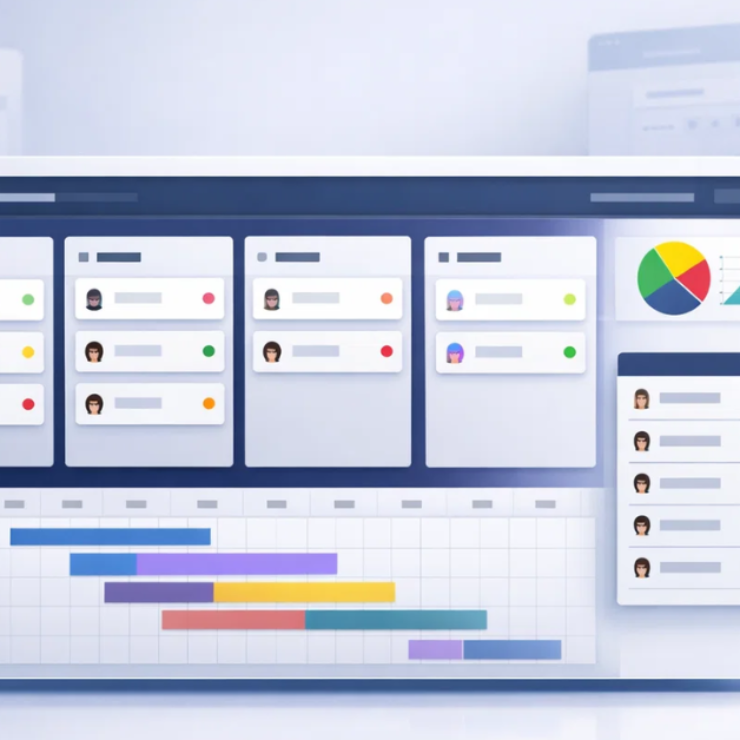A Comprehensive Guide to Track Project Progress and Deliver Projects On Time
Every project manager knows the importance of a project’s success in developing an elevating career graph for the organization and themselves. Managing a project considering all factors is a difficult job for sure. Besides all, it is project manager’s responsibility to ensure that the project runs smoothly and meets the desired goal. For this, one needs to focus on tracking project progress. By effectively tracking the progress of a project, one can easily detect possible bottlenecks and make adjustments to keep it on track.
A report submitted by the Project Management Institute informed that businesses waste around 11.4 percent of their investment due to poor project performance. Besides those who ignore effective project management, 67 percent of them witnessed project failure. The success of a project depends on the smooth movements of different parts, like timelines, risks, customer satisfaction, people, budget, etc. This can only be done through project tracking.
Here, we have mentioned some valuable recommendations that can help you make your project progress tracking smooth and effective. Read on.
Understanding Project Tracking and Its Importance
In simple words, project tracking is the process of monitoring the progress of all tasks and activities of a project. This is generally carried out by a project manager to analyze whether the project is progressing as per the plan with respect to budget and time. Effective project tracking can help you in data-based decision-making, better-quality management, time management as well as budget management.
Besides, it also helps you maximize the project’s resources creating high chances of completing a project successfully. For instance, with the use of different tracking methods like Gantt charts, kanban boards, or burndown charts, the project manager can proactively manage risks, optimize resources, and deliver projects successfully within the defined scope, schedule, and budget.
Challenges Faced in Tracking the Project Progress
- Poor Estimates for Project All projects start with some estimates, and an error at this stage can highly affect the success rate of the project. Accurately, the incorrect estimation of time, resources, and budget can hamper the project deeply. There are three important phases where your estimate may go wrong, i.e., estimating the project’s importance and feasibility, estimating the baselines, and setting an unrealistic deadline for the project. This all together can cause project delays, budget overruns, and resource shortages.Well, you can avoid such issues with data-driven analysis of resources by talking to the stakeholders and your team.
- Setting Unclear Objective One of the common reasons behind project breakdown is setting vague visions or objectives. Be clear and smart about the project objectives, with SMART Goals we mean, i.e., Specific, Measurable, Attainable, Relevant, and Time-based.EG: For instance, if a team is working on a software development project with unclear milestones or objectives it can be hard to track progress accurately. Team members may not know what they are working towards, leading to confusion and delays.
- Scope Creep Scope creep is a situation where project objectives, or requirements go beyond the pre-defined ones. This may happen due to two major reasons, i.e., an unplanned project and an absence of stakeholder engagement in the project. To avoid this, you should engage with the stakeholders from the beginning of your project. Consider their feedback and set achievable deadlines.EG: Let’s say a marketing campaign project keeps adding new features or requirements without evaluating the impact on the timeline and resources. This scope creep can make it challenging to track progress as the project keeps expanding beyond the initial plan.
- Lack of Accountability Lack of accountability can be a significant obstacle to project success. To ensure the smooth progress of the project, there should be effective reporting from the side of the team as well as the project manager. Every team member must report about their current progress daily. On the other hand, as a project manager, you should provide your clients with correct information about project performance.
- Lack of Resources It is about a lack of workforce, budget, and time to complete a project. Such an issue can arise due to poor resource management, inaccurate estimates, and poor negotiation skills. However, an effective resource management plan can help you overcome this issue. You can also use project management tools to keep track of resources and their allocation.EG: if a project is understaffed or lacks the necessary tools and technology tracking progress becomes harder. Like, a construction project may face delays in tracking progress if there is a shortage of skilled labor or equipment.
Some Effective Strategies for Project Tracking
- Set a Clear Goals Every project manager should remember that setting clear objectives is an important part of successful project progress tracking. As mentioned earlier, while setting goals, you can take the help of the SMART framework. With this, you can offer your team a transparent roadmap to attain the desired project outcome. Furthermore, it also allows you to assess the progress and efficacy accurately while making any required adjustments to align with the project objectives.
- Take Help of Project Management Tools Use different project management or tracking tools to track project progress smoothly. The options are more and these tools come with many useful features to maintain 100% accurate records. Using tools like Karya Keeper you will get a bird’s eye view of the project’s progress with a few simple clicks. Besides, these tools allow you to update and assign tasks for everyone to view. This, in turn, can lower the chances of miscommunication. They also play an important role in informed decision-making. Utilize project management software like Karya Keeper, Trello, Asana, or Jira to create tasks, assign responsibilities, set deadlines, and track progress in real-time. These tools can streamline communication and collaboration among team members
- Closely Monitor All Key Metrics Understanding key metrics that are crucial for your project can offer you useful insights into the project’s progress. By monitoring those metrics, you can identify areas that can be improved. They can help you find out the skills gap and check whether you are under the budget or need to re-estimate the expenditure. Some of the important metrics that you need to consider here are time spent, budget spent, resource utilization, and tasks completed.
- Effective Communication It is always said that when in doubt, communicate, but communication doesn’t always mean a string of long email chains. Meet with the team member if you have a question. Be as approachable as possible so your team feels comfortable coming to you with questions or concerns.Set aside time to answer questions. Always communicate professionally and respectfully. Be approachable and friendly. Acknowledge work that is done well and think of ways to do tasks better next time.
- Regular Progress Meetings: Conduct team meetings to discuss progress, address any roadblocks, and ensure everyone is on the same page. These meetings provide an opportunity to review achievements, adjust timelines if needed, and keep the project on track.
- Encourage Team Work Experienced project managers know that Gantt charts, Waterfall diagrams, etc., can’t always help a team to progress smoothly. Well, these things can help, but sometimes, your team needs something extra; motivation. When dealing with a complex project, it will be challenging to keep every member motivated. But you need to try your best to motivate and encourage them to create a productive, happy team. For that, you should complement your team members who are performing well, let them know you believe in their skills and abilities, and offer your team an open environment.
- Always Use Milestones and Checklists Divide the entire project into different milestones. This way, attaining every milestone will take your team one step closer to completing the project. You can also create a checklist to easily measure various aspects of the project. Make a weekly to-do list and mention the tasks that you need your team to complete in a week. Then, you can check the list at the end of every week to measure the tasks you and your team have completed.
- Hold Team Meetings Regularly You should regularly meet with your team and discuss about the latest updates related to the project status. Some decisions depend on regular updates and if you make any delay in this, it can also delay the project progress. Besides, by holding meetings regularly, you can also ensure that all team members are on the same page and working towards the same goals. Team meetings are quite effective in developing a sense of accountability and ownership. It also offers your team a chance to brainstorm.
- Establish Deadlines While it is necessary to set a project deadline, it is also crucial to set a deadline for every individual task, considering the task’s complexity and priority. After that, work together with your team to complete the task within that deadline. If there is a delay, then complete the task on a priority basis. However, if the task is completed before or on time, then you are on schedule and can complete the project on time.
- Update Stakeholders Regularly Don’t forget to send your project reports to the stakeholders once you have created them. Besides, you should also invite them to participate in the update meetings and ask them to share their feedback. This way, you can make changes without facing many issues.
- Choose KPIs Carefully Instead of going for random KPIs, choose relevant KPIs. Once done, don’t forget to monitor them carefully. In general, KPIs can be divided into 4 different categories such as, Budget, Timeliness, Effectiveness, and Quality. Not all projects may require measuring all these KPIs. So, before you begin with the project, discuss about this with the team and management office to decide which KPIs you need to choose and monitor for the project.
Some Best Tools for Project Progress Tracking
- Miro: This is a perfect workspace for easy project management and innovation. It comes with Kanban boards, flow charts, and mind map features. Project managers can use this tool for creating project phases, brainstorming, and letting the team visualize project progress. You can also integrate with other tools such as Slack, Jira, and Asana.
- Microsoft Project: This tool has emerged as a comprehensive project management tool. With features like resource management, Gantt charts, and reporting, tracking the progress of each task and team member will be much easier.
- Monday.Com: It offers you an interactive dashboard where you can check all the things related to the project, such as resources, budget, and more. Some of the key features of this tool are a planning tool, built-in templates, reminders, progress statistics, reporting, and pulse surveys.
- Jira: This tool is quite popular among Agile development teams. With this, you will get easily customizable Kanban and scrum boards that will fit into the workflow of your team. Besides, it has a reporting tool that allows you to get progress reports for every sprint.
- Smartsheet: As a leading project execution tool, it offers a real-time project management facility. You will also get collaboration, automation tools, dashboard reporting, resource management tools, etc., on this platform. You can use this for both Agile and Waterfall-based projects., sprint planning, product launches, and more.
- Karya Keeper: This project management platform allows teams to work together to organize, plan, collaborate, and brainstorm on a project utilizing documents, whiteboards, tasks, chat, etc. Apart from the reporting, task management, and scheduling functions. It can also automate some processes that require the inclusion of multiple users. You can set project goals using the tool’s OKRs- Objective and Key Results framework.
How to Deliver Projects on Time?
- Establish a consistent habit and focus on better time management.
- Always set a deadline for every goal by estimating the time you need to accomplish the goal.
- Don’t forget to plan and allocate the resources efficiently.
- Work with a flexible mindset and be open to new suggestions and ways to complete the task.
- Establish efficient communication channels for your team, clients, stakeholders, etc.
- Create the right team for the project.
- Utilize various visual aids to measure project progress.
- Hold meetings regularly, detect risks, and come up with the right solutions.
Conclusion
Successful project management is a blend of meticulous planning, effective communication, and agile execution. With the right tools and mindset, you can navigate the complexities of project delivery with confidence and achieve your goal. If you wish to complete the project under the deadline, there are no alternatives to tracking the progress with the right methods. The tips listed above can help you a lot if you want to attain the objectives on the decided schedule and within the set budget.
Tracking the progress of the project will boost your team’s overall performance while increasing the chances of completing a project successfully. Businesses can always leverage modern project-tracking tools to streamline the process, ensuring fail-safe and hassle-free tracking.



